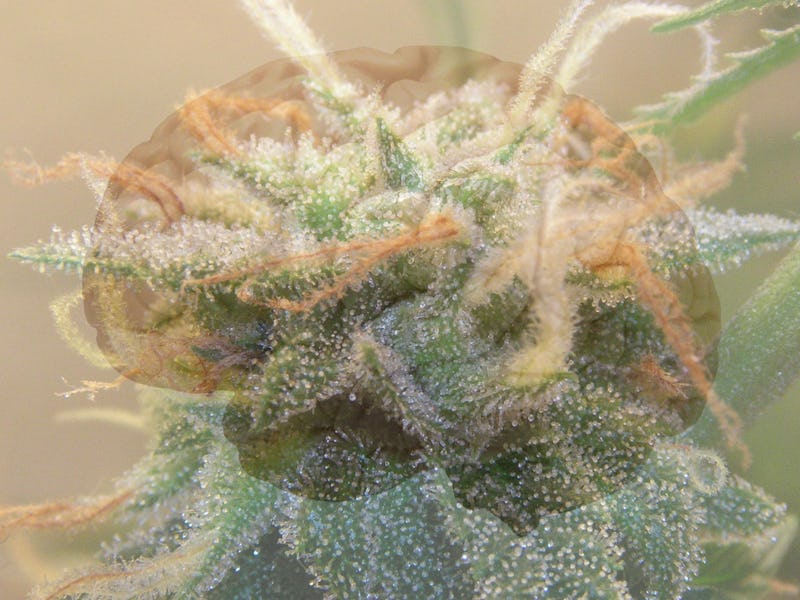Misreporting on Cannabis Study Suggests Drug Is Harmful to the Brain
Don't always trust the headlines.

A new study on marijuana is getting attention in the press, but the headlines about it may be misleading because the study was not actually about marijuana. If that sounds crazy, bear with us and we’ll explain.
It seems like every week a new research paper comes out that gives us new insights into the healing potential of cannabis, as well as new warnings about its potential negative side effects. For instance, in May 2017, scientists showed that THC seemed to reverse the effects of aging in mice’s brains, and in October 2017, scientists outlined how long-term marijuana use can increase people’s risk of certain mental health issues. It’s great that we’re learning more about the drug that’s used by one in eight adults in the US, but not all the information out there is helpful.
Most recently, the way that media outlets reported on a study published July 10 in the Journal of Neurochemistry suggested that marijuana use has significant negative side effects on the brain. The study, by researchers from Lancaster University in the United Kingdom and Lisbon University in Portugal, yielded some pretty sensational headlines: “Long-term use of cannabis or medication derived from the drug impairs memory, conclude researchers,” writes The Daily Mail; “Study: Long-Term Cannabis Use May Lead To Serious Memory Impairments,” says StudyFinds; “How cannabis and cannabis-based drugs harm your brain,” reads the press release from the Lancaster University.
Synthetic cannabinoids bind to cannabinoid receptors, but they're not the same as THC and CBD.
But this study was not about marijuana. It was about a chemical called “WIN 55,212-2.” This chemical is a synthetic cannabinoid, which means it binds to the same receptors in the brain as marijuana’s active chemicals Δ9-tetrahydrocannabinol (THC) and cannabidiol (CBD). But it’s not the same as marijuana, and it’s not derived from marijuana.
“It is very structurally different than THC but used in research because it agonizes CB1 receptors,” Ryan Marino, M.D., a toxicology fellow at the University of Pittsburgh Department of Emergency Medicine who wasn’t involved in the research, tells Inverse.
So the headlines that suggest this study is about the possible harmful effects of marijuana don’t really give an accurate impression of what the study is about.
To be fair, the study shows an interesting effect, just not one that’s caused by marijuana. In the paper, the study’s authors show evidence that heavy, frequent use of WIN 55,212-2 can impair recognition memory in mice, the type of memory associated with recognizing people, places, and things you’ve seen before. They also show that WIN 55,212-2 can impair functional connectivity in mice’s brains, which means that it can keep different brain areas from effectively communicating with each other. But again, since the chemical in question was not THC or CBD, any conclusions we draw from this research must be very carefully balanced with the caveat that the study did not involve marijuana.
And in fact, even though WIN 55,212-2 acts on the cannabinoid type 1 (CB1) receptor, there’s evidence to suggest that it acts differently than the cannabinoids in marijuana. A 2010 study on mice shows evidence that WIN 55,212-2 and THC have different effects on the behavior of mice in a maze task. It’s a fairly different chemical, too, one that binds more strongly to CB1 receptors than THC does.
But the casual reader might not grasp this difference if they read The Daily Mail or the press release that accompanied the study.
Mice aren't humans, and WIN 55,212-2 isn't THC.
“This work offers valuable new insight into the way in which long-term cannabinoid exposure negatively impacts on the brain,” Neil Dawson, Ph.D., a biomedicine researcher at Lancaster University and one of the authors on the paper, said in the university’s press release. “Understanding these mechanisms is central to understanding how long-term cannabinoid exposure increases the risk of developing mental health issues and memory problems.”
And to a certain degree he’s right, but since this study only focuses on mice exposed to a synthetic cannabinoid over 30 days, it’s really hard to draw these big conclusions, especially since “chronic” marijuana smokers usually smoke for more than 30 days.
“I don’t know how to necessarily extrapolate mouse data with WIN 55,212‐2 into humans with THC, which I’d caution against even though that press release seems to imply equivalency,” says Marino.
This isn’t to say the study should be thrown out, as it does show an effect, one that should be investigated further. But it is to say that when you read about drugs in the news, always be skeptical, and always read the original study if you have questions since press releases and news articles can sometimes miss the big picture and draw big, flashy conclusions. After all, science is rarely sexy and huge. More often, the results of scientific studies are incremental, small, and not that flashy. But every published paper is part of the process, a step on the road to a deeper understanding.
“I think it shows a potential effect (and they do a great job delineating the mechanism) — which could happen in humans who use THC,” says Marino. “But we can’t conclude that the same thing happens in a different species with a different chemical (or many chemicals in the case of cannabis).”